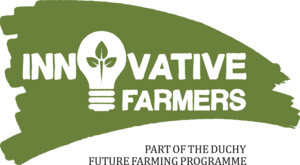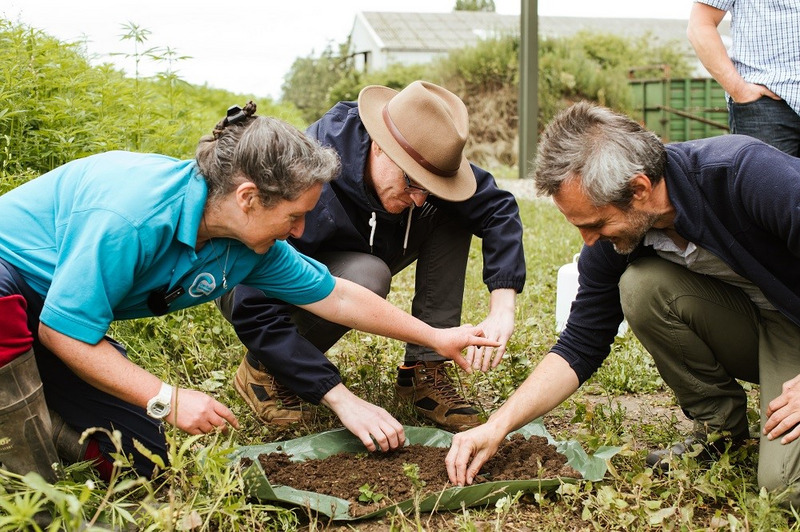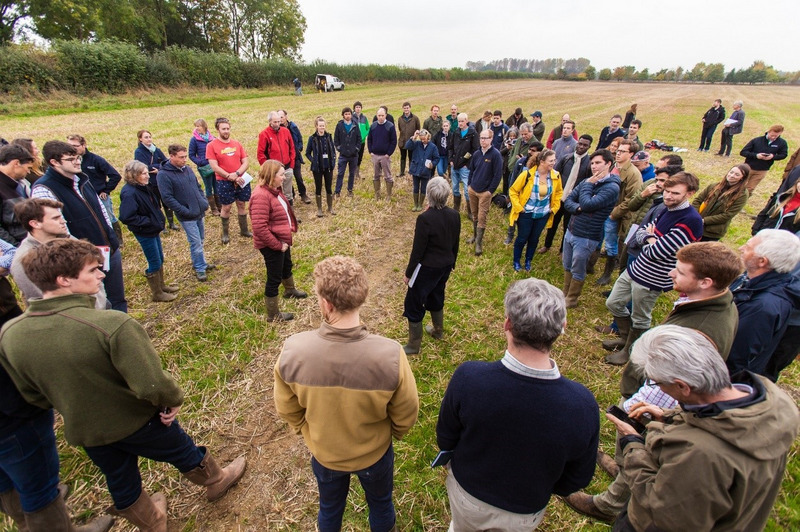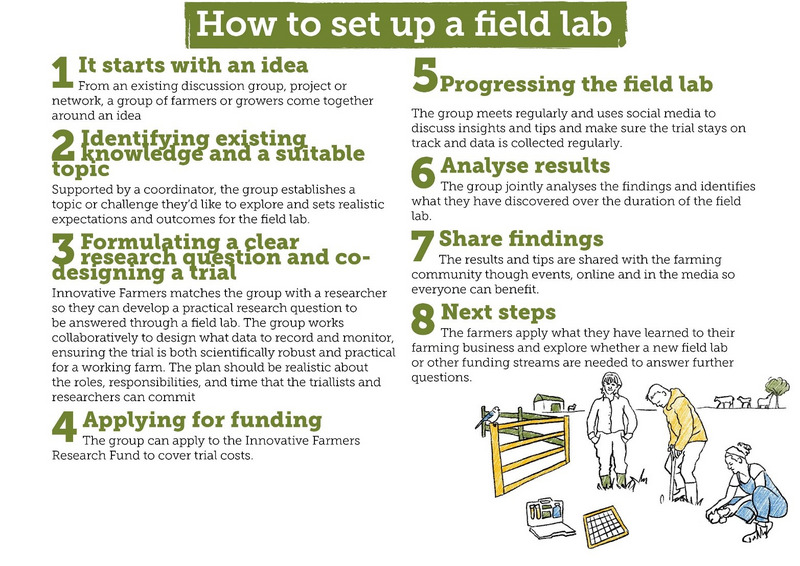Innovative farmers
Living Lab

Innovative Farmers is a not-for-profit network that gives farmers in the UK research support and funding on their terms. This helps farmers find lasting solutions to practical problems, from managing weeds and pests with fewer chemicals to testing more sustainable animal feeds. Members of the network can connect with other innovative farmers, researchers and stakeholders who share a passion for finding new ways to farm, and have the opportunity to take part in farmer-led trials, known as ‘field labs’. The programme covers all farming sectors and works with both conventional, regenerative and organic farmers.
Aim
Farming is facing mounting pressures as climate, nature and health crises demand more from
farmers and land managers. By supporting farmers to drive the direction of research they’d like to see and matching them with other farmers and researchers to test practices and solutions in multiple farming contexts, Innovative Farmers aims to speed up the adoption of innovative practices and ensure that the learning doesn’t just stay on the farm. Through the small grants we aim to address the need for more UK agricultural R&D funding in farmer-led, non-market solutions, recognising farmers the primary beneficiaries of agricultural research. We aim to increase farmers’ confidence in on-farm experimentation and innovation, foster new collaborations and benefit researchers by providing access to farmers that can ground truth their ideas and widen the impact of their research. More widely, the goal is to communicate field lab progress and findings with more farmers, and support practices that increase farm sustainability, resilience and animal health and welfare.
Short background information
The programme launched in 2012 and was then known as Duchy Future Farming Programme and was backed by a delivery group from LEAF (Linking Environment and Farming), Innovation for Agriculture, the Organic Research Centre and the Soil Association, with the Soil Association being responsible for overall management of the programme.
At the time, the concept of ’field labs’ - on-farm trials - was not well understood. The model has been piloted, tweaked, developed and adapted because every new potential field lab idea brings together a unique set of opportunities to build our understanding of what works. However, the programme’s ambition has remained much the same today as it was a decade ago – to put farmers in the driving seat of research. Over the past decade we have created a network of thousands of inspiring farmers and growers co-designing trials with the research community and collaborating with industry bodies. We have awarded £453,000 in small grants to make the research possible.
Soil scientists Lynda Deeks trains hemp growers on low-cost ways to assess their soil health in a field lab exploring how growing hemp impacts soil health, carbon sequestration and biodiversity

Funding
Our core funder is the Prince of Wales Charitable Fund (PWCF) through sales of Duchy Organic products at Waitrose (a major supermarket brand in the UK). PWCF have generously supported the programme since its inception. Other major sponsors include the Agricultural and Horticultural Development Board, Swire Charitable Trust, the National Lottery Community Fund and UKRI. In addition, some individual field labs receive financial sponsorship or in-kind support.
Activities
- Specialist advice and support to get field labs off the ground
- Connecting farmers with other farmers that share a common interest in problems/ideas to explore
- Matching the group with a dedicated independent coordinator to keep the field lab on track and facilitate the co-design process, and researcher for advice on trial design and time to do assessments, monitoring and analysis
- Organising network events, conference sessions and other field lab open days
- Communication: This includes open days, webinars, monthly e-newsletters, knowledge exchange videos and blogs, social media, open-source publishing of progress and findings, dedicated web content for each field lab, and working with the farming media to feature field labs and the farmers in the network.
- Reporting, evaluation and quality assurance. This includes input from a steering group made up of industry experts and academics who assess field lab applications.
Innovative Farmers future of weeding event

Achievements
- Launched over 120 field labs across the UK
- Over 600 farmers have taken part in on-farm trials through the field labs
- Half of farmers said they have made changes to their farming practices because of field labs (2021 evaluation)
- Real changes on the ground include :
- 50% of UK hops growers now grow cover crops in their hop yards (prior to the field lab, only one grower was experimenting with cover crops)
- Identifying innovative solutions which increase farm sustainability and reduce costs. For example, the interim results from an ongoing field lab has found that in dairy farming, by using an on-farm test to detect where mastitis cases will cure without antibiotic treatment, farmers can reduce antibiotic use by an average of 35%.
- Supporting the larges, long-term, participatory trials to date, looking at silvopasture (intergrating trees in livestock production).
- Changes on individual farms, e.g. growing buckwheat as a permanent part of a rotation for couch grass control; farmers inspired to bring back sheep back onto their arable farms after decades
- Farmers and researchers equipped with research evidence to make the case for further government support for agroecological practices
- Farmers and researchers demonstrating the value of collaboration and on-farm trials, enablishing them to access larger external funding pots to continue with their research
- 84% of people in the network said they have learned something new (2021 evaluation)
- 12,000 farmers have engaged in other activity such as attending on-farm events, conferences, watching our knowledge exchange videos or reading the Innovative Farmers newsletter
- Showcasing the network: Farming press coverage of field lab activity and farmer voices is read over 133,000 times a month.
Further information and links
- Field lab journal – 2022 case studies
- Film: Farmers facing up to the challenges of an uncertain world: Youtube video
- Film: The tomato growers using plant sensors to reduce crop loss: Youtube video
- Knowledge exchange film: Preparing your pasture for a drier climate: Grazing sheep on lucerne in the UK
- Innovative farmers presentation, held at the 1st pilot network meeting

 tap and then scroll down to the Add to Home Screen command.
tap and then scroll down to the Add to Home Screen command.